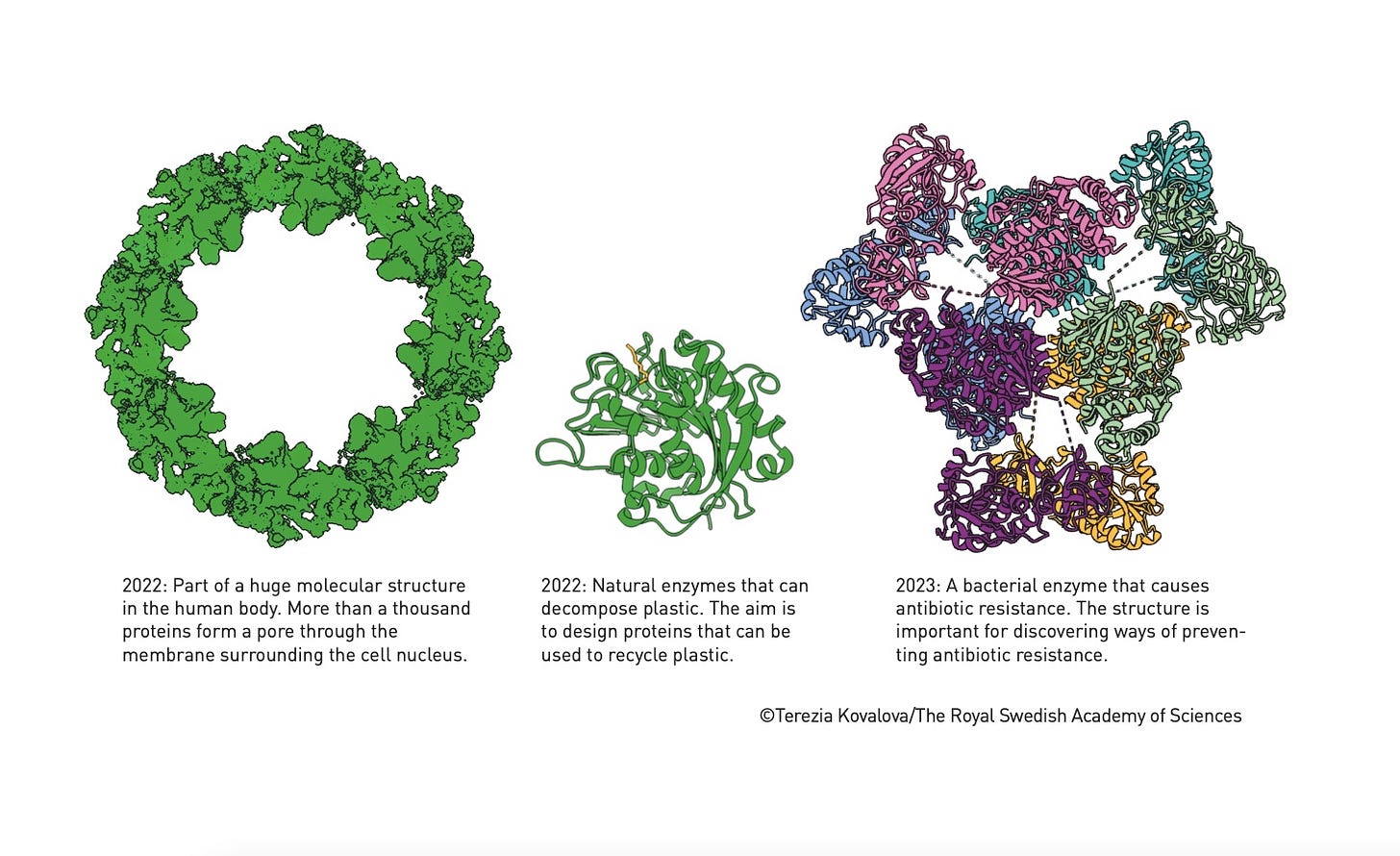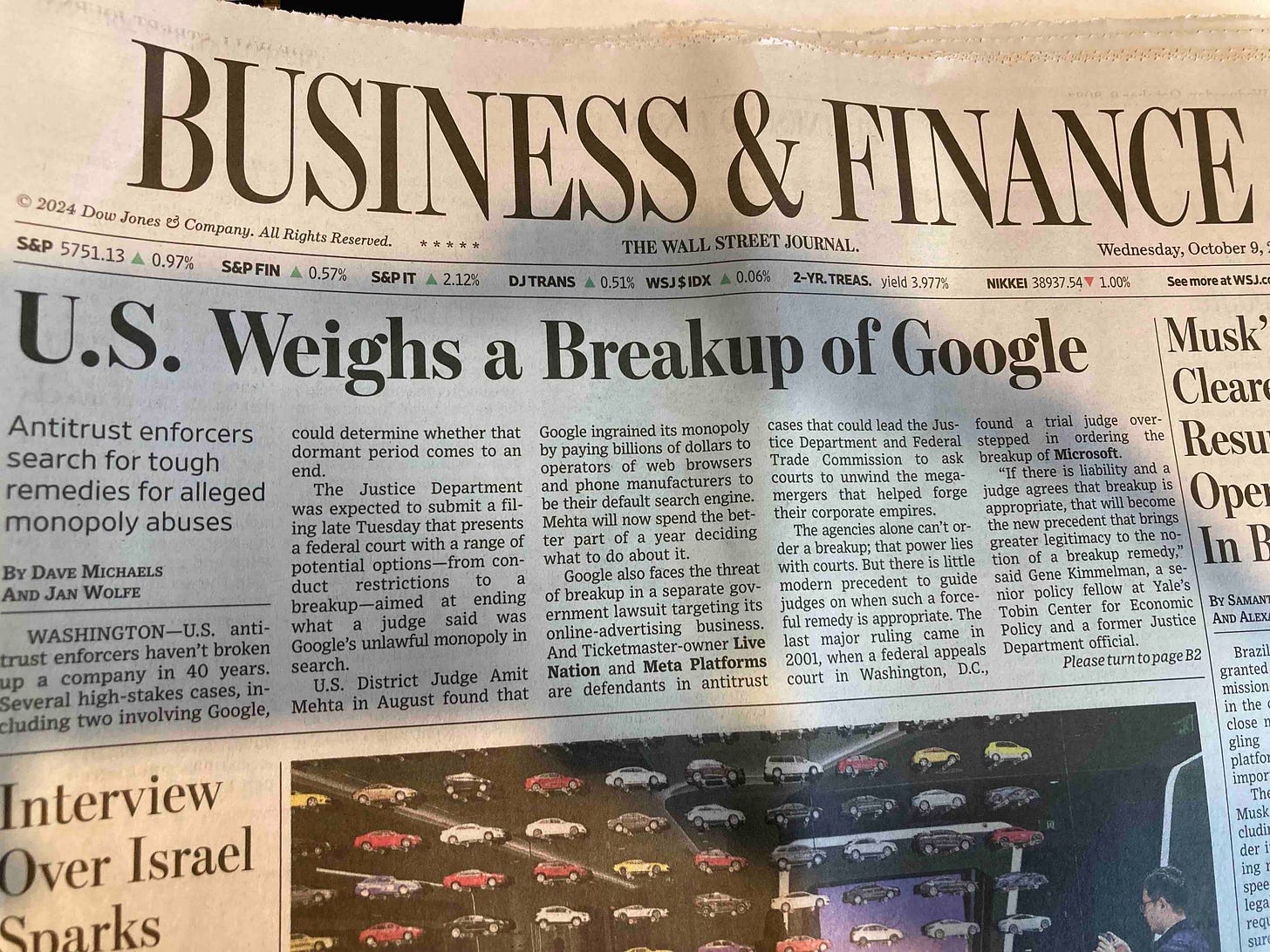A Nobel for Google
The Swedish Academy sends Merrick Garland, and Alan Garber, a timely message

The Royal Swedish Academy of Sciences today announced Demis Hassabis and John Jumper of Google DeepMind as two winners of the 2024 Nobel Prize in Chemistry. The previous day, the Academy announced Geoffrey Hinton, who had worked at Google for more than a decade, until 2023, as a winner of the 2024 Nobel Prize in Physics.
Meanwhile, here is today’s Wall Street Journal headline: “U.S. Weighs a Breakup of Google.”
It’s enough to make you wonder what’s wrong with Washington. The Swedes at least are shrewd enough to reward excellence with prizes; in America, it can sometimes seem as if we punish success. Instead of a prize medal and a white-tie dinner in Stockholm, you can expect a lawsuit instead from Merrick Garland’s Justice Department, and the privilege of paying the genuinely wonderful Karen Dunn (who clerked for Garland) to fend off the Justice Department’s jackalbins.
And this is a bipartisan problem. While the Biden Justice Department has been pursuing Google, President Trump and Senator Vance have both also been repeatedly and openly publicly critical of what they deride as Big Tech. Not that Big Tech is perfect or that the Nobel is the only or ultimate measure of success, but the politicians might want to be a little more hesitant before demonizing or crushing one of America’s most winning industries.
Yet The Editors are a cure for negativity bias, so while we’ll rue the regulatory onslaught, we’ll also celebrate that the prizewinner, Google, is an American company. It says something about the power and durability of American capitalism that a company like Google can flourish even despite a hostile public-policy environment.
And there’s an additional point to be made about competition and choice and Google. It has to do with the problems in American higher education, which are a frequent topic here. People have started to realize that there is competition among institutions and choice for students, so prospective students put off by the campus chaos, antisemitism, and stifling ideological conformity of places such as Harvard or Columbia might choose instead to consider applying to, or attending, alternatives such as the University of Florida, Emory, Dartmouth, Vanderbilt, or the University of Chicago.
Yet there is a market for faculty talent, too, and there the choices include not only the academy but also industry. Just as physician-researchers sometimes leave academic medicine for pharmaceutical companies, the engineers, chemists, physicists, and computer scientists have choices, too. They can make careers in universities or in industry, or try to do both simultaneously. The worse the conditions become in academia—poisonous faculty politics, cancel culture, performative “wokeness,” the decline of meritocracy in favor of other values such as “equity” or bureaucracy—the greater the relative attraction of choosing to make a career instead at Google or some company that will be the next Google. Google parent Alphabet’s market capitalization is on the order of $2 trillion, which makes Harvard’s roughly $50 billion endowment look puny (sorry, President Alan Garber) by comparison.
Perhaps the risk of a talent exodus, “brain drain,” from academia to industry, will put some market pressure on higher education to create conditions that are conducive to scholarship. The talent flow goes in both directions—Hinton, after all, noisily left Google to return to academia. What is constructive are the incentives created by a marketplace for top scientific talent. They have to do with economic compensation but also with the freedom to pursue research with the needed resources, amid bright and supportive colleagues, and without too many hassles and distractions.
The Nobel for Google is a reminder that universities aren’t the only places where significant discoveries happen. The U.S. government’s antitrust lawyers profess to be worried about Google being a monopoly. But in a larger sense what Google and similar innovative companies are doing are providing healthy competition to academia’s monopoly on scientific research and discovery. That’s prizeworthy.
Thank you: The Editors is a reader-supported newsletter. We have neither a $2 trillion market capitalization like Google nor a $50 billion endowment like Harvard. If you can spare the $8 a month or $80 a year please become a paying subscriber today and help sustain our growth and ensure your continued full access to the content. Thanks to those who already have done so.




The effort to stop Google from winning more Nobel Prizes is striking.
It reminds me of the effort to stop Israel whenever it is winning in fighting terrorists.
When Donald Trump said we'd be winning so much that we'd get tired of winning it seemed like a prediction of what would happen under a Trump presidency. Who would have guessed that it was about what would happen under a Biden presidency?
This is Bell Labs, redux.